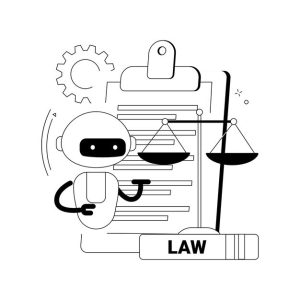Artificial intelligence technology continues to revolutionize industries across the world at a global scale including the legal industry. Law practitioners use artificial intelligence to simplify their practice thereby increasing performance while transforming complex operations into automated processes. AI will not accomplish a complete substitution of legal practitioners within the foreseeable future. AI systems are designed to enhance legal services whereas professionals rather than substitute their roles in the field.
The Rise of AI in Legal Practice
AI technology has fundamentally altered the work practices in the legal field. Machine learning together with natural language processing tools enable AI to help lawyers conduct research as well as review documents and analyze contracts and predict the outcomes of cases. The tools provide speedy analysis of extensive legal content which helps professionals save time for addressing specialized tasks in their work.
Key Applications of AI in Law
Document Review and E-Discovery: The analysis of large quantities of documents becomes more efficient using AI software that finds crucial information in vast databases. Brief legal investigations along with decreased manual document assessment procedures become possible due to this system.
Contract Analysis: The analysis capabilities of AI inspect contracts to uncover essential terms while discovering both conflicting elements and prospective threats thus yielding an enhanced both precise and speedy evaluation process.
Legal Research: Artificial Intelligence research platforms utilize automated tools to retrieve needed legal documents instantly which speeds up comprehensive research periods.
Predictive Analytics: Artificial Intelligence examines historical legal cases to generate predictions which enhance lawyer decision-making abilities and strengthens their client strategies.
Why AI Won’t Replace Lawyers Completely

Several factors prevent artificial intelligence from completely replacing lawyers even though it significantly alters modern legal practice.
1. Limited Accuracy and Reliability
AI systems produce responses based on the data patterns they recognize although they do not operate without errors. Legal technology services sometimes fail to properly understand legal texts which results in wrong computational results and outdated knowledge during operations. Mistakes in legal cases must be perfect because any imperfection can trigger serious legal consequences. Artificial intelligence requires constant human supervision because it needs human intervention to verify consistency with existing laws.
2. The Importance of Emotional Intelligence and Human Judgment
Adjusting legal practice above studying statutes and case law requires lawyers to engage with people in addition to negotiation and advocacy work. As legal advisors lawyers deliver both psychological backing and professional guidance and decision-making assistance to their clients. Artificial intelligence systems fail to comprehend human emotions along with trust-building capabilities and complex relationship understanding necessary for legal situations that involve family law and criminal defense as well as corporate negotiations.
3. Ethical and Confidentiality Concerns
The use of AI systems in law practice leads to multiple legal privacy and ethical problems. AI-based systems examining legal cases provide security risks when used as the sole information processing method because such cases frequently contain confidential details. The mechanical output from AI lacks the capability to fulfill ethical standards which requires human lawyers to make professional decisions based on discretion.
4. Complex Decision-Making and Advocacy
Technology has not yet developed sufficient abilities in assessing complex legal matters or building persuasive court cases and providing courtroom advocacy. Throughout litigation lawyers must examine complex legal matters while creating strong arguments and adjust their strategies to sudden changes in the case. AI tools help lawyers with their research work and develop strategies yet these human capabilities cannot substitute for the valuable critical thinking and advocacy expertise lawyers deliver to their clients.
The Future of AI and Law: A Collaborative Approach

The integration of AI into the legal practice is expected to enhance lawyer capabilities so they accomplish their work faster and direct their efforts toward critical legal tasks. Lawyers implementing AI technologies become more efficient with their work and remove documentation loads which enables them to supply higher quality services to their clients.
How Lawyers Can Adapt to AI Integration
- Develop Tech-Savvy Skills: Legal experts need to study AI-enabled legal platforms while learning appropriate methods for bringing these tools into their professional work.
- Focus on Human-Centric Skills: Attorneys need to highlight their human capabilities which AI systems cannot do such as showing emotional intelligence while also thinking strategically and conducting persuasive advocacy.
- Ensure Ethical AI Use: Law firms need to create rules that direct proper AI implementation by verifying AI results for ethical compliance.
Final Thoughts
AI technologies are transforming the legal practice but do not present a threat to eliminate lawyers entirely from their roles. AI Legal practice will progress ahead due to the integration of automated efficiency through AI technology with human-specific expertise. Legal professionals implementing AI technology as a versatile tool will maintain essential human-based legal practices to offer high-quality services in digital environments.









